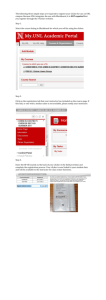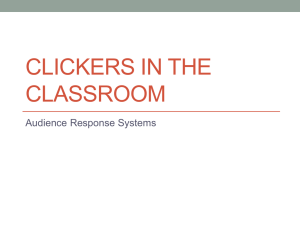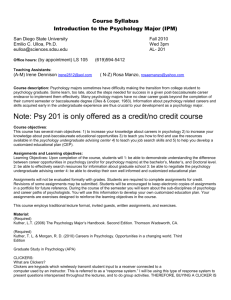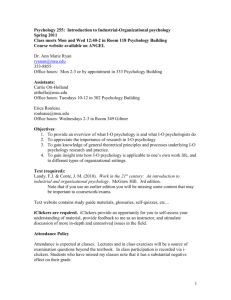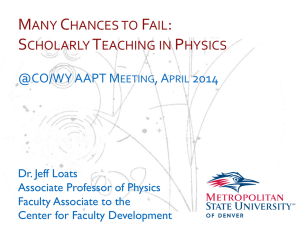Note: PSY 201 is only offered for credit/no credit
advertisement
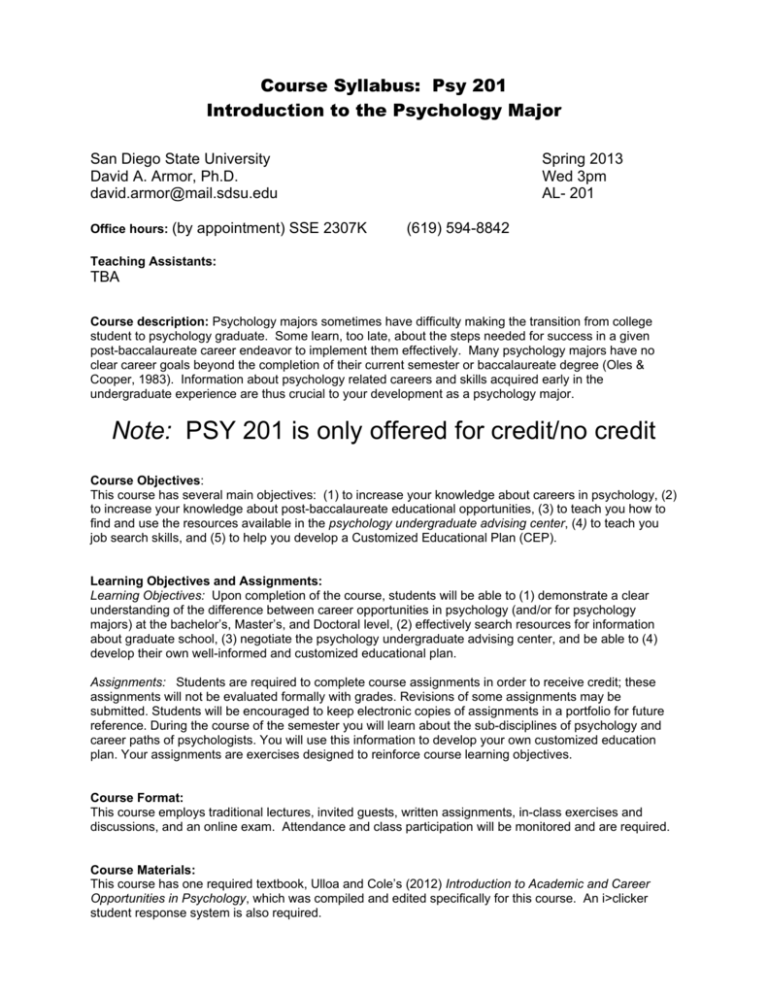
Course Syllabus: Psy 201 Introduction to the Psychology Major San Diego State University David A. Armor, Ph.D. david.armor@mail.sdsu.edu Office hours: (by appointment) SSE 2307K Spring 2013 Wed 3pm AL- 201 (619) 594-8842 Teaching Assistants: TBA Course description: Psychology majors sometimes have difficulty making the transition from college student to psychology graduate. Some learn, too late, about the steps needed for success in a given post-baccalaureate career endeavor to implement them effectively. Many psychology majors have no clear career goals beyond the completion of their current semester or baccalaureate degree (Oles & Cooper, 1983). Information about psychology related careers and skills acquired early in the undergraduate experience are thus crucial to your development as a psychology major. Note: PSY 201 is only offered for credit/no credit Course Objectives: This course has several main objectives: (1) to increase your knowledge about careers in psychology, (2) to increase your knowledge about post-baccalaureate educational opportunities, (3) to teach you how to find and use the resources available in the psychology undergraduate advising center, (4) to teach you job search skills, and (5) to help you develop a Customized Educational Plan (CEP). Learning Objectives and Assignments: Learning Objectives: Upon completion of the course, students will be able to (1) demonstrate a clear understanding of the difference between career opportunities in psychology (and/or for psychology majors) at the bachelor’s, Master’s, and Doctoral level, (2) effectively search resources for information about graduate school, (3) negotiate the psychology undergraduate advising center, and be able to (4) develop their own well-informed and customized educational plan. Assignments: Students are required to complete course assignments in order to receive credit; these assignments will not be evaluated formally with grades. Revisions of some assignments may be submitted. Students will be encouraged to keep electronic copies of assignments in a portfolio for future reference. During the course of the semester you will learn about the sub-disciplines of psychology and career paths of psychologists. You will use this information to develop your own customized education plan. Your assignments are exercises designed to reinforce course learning objectives. Course Format: This course employs traditional lectures, invited guests, written assignments, in-class exercises and discussions, and an online exam. Attendance and class participation will be monitored and are required. Course Materials: This course has one required textbook, Ulloa and Cole’s (2012) Introduction to Academic and Career Opportunities in Psychology, which was compiled and edited specifically for this course. An i>clicker student response system is also required. Textbook (Required): Ulloa, E. & Cole, K. Eds. (2012). Introduction to Academic and Career Opportunities in Psychology. First Edition. Cognella. The required book for this course, Introduction to Academic and Career Opportunities in Psychology (First Edition), is published by Cognella Academic Publishing and distributed by University Readers, Inc. The book is now available for purchase through the University Readers' student e-commerce store (https://students.universityreaders.com/store/). To purchase the textbook, please follow the instructions below: Step 1: Log on to https://students.universityreaders.com/store/. Step 2: Create an account or log in if you have an existing account to purchase. Step 3: Easy-to-follow instructions will guide you through the rest of the ordering process. Payment can be made by all major credit cards or with an electronic check. Step 4: After purchasing, you can access your partial e-book (FREE 30% PDF) by logging into your account and clicking My Digital Materials to get started on your readings right away. Orders are typically processed within 24 hours and the shipping time will depend on the selected shipping method and day it is shipped (orders are not shipped on Sundays or holidays). If you experience any difficulties, please email orders@universityreaders.com or call 800.200.3908 ext. 503. Clickers (Required): What are Clickers? Clickers are keypads which wirelessly transmit student input to a receiver connected to a computer used by an instructor. Clickers allow students to respond to class-relevant questions that will be presented throughout the lectures and to do group activities. They are required. Clicker Policies: BUYING A CLICKER IS MANDATORY FOR THIS CLASS. CLASS PARTICIPATION, WILL BE TRACKED USING THE CLICKERS. STUDENTS MAY BE CALLED AT RANDOM BASED ON CLICKER ATTENDANCE. USING ANOTHER STUDENT’S CLICKER, SENDING YOU CLICKER WITH SOMEONE ELSE OR ANY OTHER USE OF CLICKERS OUTSIDE OF THE PRESCRIBED USE IS CONSIDERED CHEATING AND IS PUNISHABLE AS SUCH. For More Information: The SDSU Information Technology Services (ITS) has a useful website with more information and important links about the clickers: http://clicker.sdsu.edu Why i>clickers? SDSU has had a campus standard student response system (“clickers”) since 2003. In 2011, the SDSU Instructional Technology Services (ITS) department convened a taskforce of faculty, staff, and students to select new clickers for SDSU. This taskforce selected the i>clicker2 based on various criteria including: cost, user experience, required faculty preparation, stability, software features, tech support, successful examples from other universities, cross platform compatibility, compliance with accessibility and privacy standards, and ease of transition. About i>clicker: i>clicker began in 1997 when a faculty team at University of Illinois began experimenting with solutions to facilitate student polling. In 2005, Macmillan acquired i>clicker, allowing for significant investments in i>clicker hardware and software. Today, inventors Tim Stelzer and Mats Selen remain deeply involved in product development and commitment to learning pedagogy. In a very short time, i>clicker has been adopted by thousands of higher ed faculty and is used by more than 1.5 million students at more than 800 institutions worldwide. Attendance: Attendance is mandatory! All students are expected to attend each class session, to have read the respective chapter before each class in order to be prepared to ask and answer questions, and to participate in class activities and discussions. STUDENTS ARE REQUIRED TO BRING THEIR CLICKERS TO EVERY CLASS. You cannot get credit for class participation without your clicker. Missed classes will not be excused for any reason. I do not accept doctors’ notes or any other written excuses. Class participation: Class participation is important, and therefore will count for 20% of your grade. Class participation points will be obtained by answering questions with your clicker during class. Your responses from your clicker are automatically recorded in my class database. I will upload the points for each day on to Blackboard at the end of each class period. You should monitor your points on Blackboard on a weekly basis to make sure everything is correct and your clicker is functioning properly. Whether or not you get the answer correct will not affect your credit for the questions. You get points by simply responding to the questions asked throughout the lectures with your clicker. Each participation day is worth 2 points. And you must be present for all clicker questions to receive points. There are more opportunities for clicker points than are necessary for credit (there are 13 days on which points are available, but you need only earn points on 10 days to receive full credit) so there are “freebies” built in to the system. This allows for occasional emergencies and allows you enough time to register your clicker and allow for drop/adds. If you forget to bring your clicker to class, you will not be able to receive class participation points for that day. I do not allow any form of “make-ups” for missed days. (There will be one opportunity at the end of the semester, however, for extra credit points that could offset missing clicker points). You will be asked to participate by answering questions with your clickers, but of course you are also encouraged to voice your own questions and comments in class on a regular basis. Assignments and Online Exam: There are four written assignments (16 points each) and one online exam (16 points), and together these will count for 80 points (5 x 16 = 80 points), which is 80% of your grade. Each assignment is designed to enhance your familiarity with career options in psychology and to prepare you for a successful experience as a psychology major. Assignments include several information interviews (A and B), the development of a Curriculum Vita (CV) or resume, and the creation of your own Customized Educational Plan (CEP). The exam will be taken online, over blackboard, and is open-book and open-notes. Evaluation: Students must earn 70 points (out of 100, or 70% of points possible) in order to receive credit for PSY 201. Students who earn fewer than 70 points will receive No Credit. Participation (based on 10 days of clicker responses): 20 points (10 x 2pts = 20pts total) Assignments (4 at 16pts each) and online exam (16pts): 80 points (5 x 16 pts = 80pts total) 70-100 = Credit 0-69 = No Credit Class Schedule and Assignments Date Lecture Topic 1/23 Introduction Obtain textbook, i>clicker 1/30 What do psychologists do? (information interview A overview) 2/6 Overview of career paths in psychology (Academic/research vs. Hands on/helping profession) Careers with the BA IN CLASS: Orientation Worksheet Advising Center orientation, Information Interview Masters degrees (helping professions and nonhelping profession) HAVE READ: Section 1 (pp. 1-23 of textbook); HAVE READ: information interview file (in “assignments” on Blackboard) COMPLETE: Personal Reflections (p. 23; counts for 2 participation points) HAVE READ: pp. 43-74, pp. 111-131. Participation points (2pts) 2/13 2/20 2/27 Jobs for Psych Majors IN CLASS: Guest Speakers 3/6 Exploring the differences between Clinical and Counseling Psychology and the PsyD 3/13 Clinical & Counseling Psych. PhD and Psy.D IN CLASS: Guest Speakers Therapy and helping professions (Masters level): IN CLASS: Guest Speakers Research careers in psychology: Exploring the PhD in Psychology (non-clinical and Clinical & Counseling Psych. PhD) IN CLASS: CV/Resume 3/20 3/27 4/3 Spring Break: Class will not meet 4/10 I/O and applied Psychology IN CLASS: Guest Speakers 4/17 Becoming involved: Service, volunteering, research experience, and internships IN CLASS: Guest Panel Preparing for graduate school (part I): Network building, letters of reference, personal statement 4/24 5/1 5/8 Preparing for graduate school (part II): Network building, letters of reference, personal statement IN CLASS: Customized Educational Plan (CEP) Last Class Extra Credit Day ALL FINAL ASSIGNMENTS ARE DUE SDSU Information Technology Services: http://clicker.sdsu.edu Assignments Due HAVE READ: pp. 109 -110. Participation points (2pts) HAVE READ: MSW, MFT (on blackboard); pp. 139-144, 151-158, 163-168, and pp. 205-220. Participation points (2pts) HAVE READ: pp. 33-37, 177-180. Bring questions for guest speakers Participation points (2pts): Guest clicker Qs HAVE READ: pp. 189-200, 221-240. ASSIGNMENT DUE: INFORMATION INTERVIEW (A) (16pts) Participation points (2pts) Bring questions for guest speakers Participation points (2pts): Guest clicker Qs Bring questions for guest speakers Participation points (2pts): Guest clicker Qs HAVE READ: pp. 131-138, 159-162, 169-176. HAVE READ: CV document on blackboard ASSIGNMENT DUE: Turn in completed orientation worksheet (2pts). Participation points (2pts) Spring Break: No additional assignments HAVE READ: pp. 145-149 Bring Questions for Guest speakers Participation points (2pts) HAVE READ: pp. 27-42; Section 3 (pp. 77-105) ASSIGNMENT DUE: CV / RESUME (16pts) Participation points (2pts) HAVE READ: Section 6 (pp. 243-317) DEADLINE: complete online exam (16pts) Participation points (2pts) HAVE READ: Customized Educational Plan (in “assignments” on Blackboard) Participation points (2pts) FINAL PROJECTS DUE: CEP (16pts) and 2 Information Interviews (B) (16pts)
